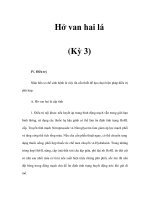Xử trí hở van hai lá quan điểm nội khoa
Bạn đang xem bản rút gọn của tài liệu. Xem và tải ngay bản đầy đủ của tài liệu tại đây (3.41 MB, 43 trang )
“Early Surgical” Mitral
Regurgitation:
View of Cardiologist
A/Prof. Phạm Mạnh Hùng, MD.PhD. FACC.FESC
Director – Cardiac Cath. Lab. VNHI
Secretary General - VNHA
PRIMARY
Pathology >=1
components (leaflets,
chordae tendineae,
papillary muscles,
annulus):
Prolapse
Rheumatic heart disease
IE, connective tissue
disor- ders,, cleft mitral
valve, radiation heart
disease…
SECONDARY
Valve normal, LV
dysfunction:
Ischemic HD
Dilated CM
MR Etiology
Normal
Degenerative MR
(Prolapse)
Degenerative MR
(Flail)
Functional MR
Ischemic vs.
nonischemic
Prognosis of
Untreated MR
Mitral Regurgitation
Natural History of Severe Asymptomatic MR
Asymptomatic with normal LV function
100
Alive, Asymptomatic
without Surgery (%)
Medicare
data
80
Kang
Sarano
*
Rosenhek
Average hospital mortality:
8.8%
*
*
60
40
20
• Low volume centers: 13.0%
Grigioni
• High volume centers: Rosen
6.0%
0 Data from national Medicare database 1994-1999
0
2
4
6
8
10
Time (years)
Bonow, J Am Coll Cardiol 2013;61:693-701
684 hospitals
142,488 AVRs
Rosen et al. Am J Cardiol 1994;74:374-380
Sarano et al. N Engl J Med 2005;352:875-883
Rosenhek et al. Circulation 2006;113:2238-2244
Grigioni et. J Am Coll Cardiol Img 2008;1:133-141
Kang et al. Circulation 2009;119:797-804
Mitral Regurgitation
Natural History of Severe Asymptomatic MR
Alive, Asymptomatic without
Heart Failure or AF (%)
Survival without Heart Failure or Atrial Fibrillation
100
Medicare
data
80
ERO <20 mm2
Average hospital mortality:
mm2
* ERO 20-398.8%
60
40
20
• Low volume centers:
36% 13.0%
ERO ≥40 mm2
• High volume centers: 6.0%
0 Data from national Medicare database 1994-1999
0
2
4
6
8
10
Time (years)
684 hospitals
142,488 AVRs
Sarano et al. N Engl J Med 2005;352:875-883
Management of 3+/4+ MR with HF (CCF)
1,095 pts* with 3+/4+ MR and HF between 2000 and 2008
(74% FMR, 21% DMR). Rx before 10/2011:
DMR pts (n=226): 84% MV surgery, 16% medical Rx
FMR pts (n=814): 36% MV surgery (77% w/CABG), 64% med Rx.
Un-operated pts had lower LVEF (mean 27% vs. 42%, p<0.0001 and higher
STS score (median 5.8 vs. 4.0, p<0.001) compared with operated pts.
100
80
% of Patients
Prognosis
of unoperated
pts with
3+/4+ MR
and HF
Mortality
Surviving pts hospitalized for HF
90
171 of 474 (36%)
un-operated pts
with FMR and good
echos would have
been eligible for
MitraClip based on
published criteria
68
58
60
50
41
50
46
37
40
29
20
20
0
1
2
3
4
5
Years
* Excluded MVA ≤2 cm2, AR ≥2+, aortic peak velocity ≥2.5 m/s, HCM, endocarditis, concomitant AV, Ao or pericardial surgeries, LVAD or OHT.
Goel SS et al. JACC 2014;63,:185–90
Mod/Sev MR after TAVR: CoreValve Registry
In 1,007 pts at multiple Italian sites with severe AS treated with 3rd gen
CoreValve, baseline no/mild, moderate and severe MR (site reported)
was present in 67%, 24% and 9% of pts, respectively.
MR Change at 1 Year According to Baseline Severity
100
Independent predictors
of MR improvement
(HR [95%CI]):
90
35%
Proportion (%)
80
47%
70
60
Improved
50
Unchanged
40
Worsened
62%
30
53%
20
10
0
8%
No/mild
3%
Moderate
Severe
Bedogni F et al. Circulation. 2013;128:2145-53
sPAP ≤55 mm Hg
2.9 [2.7–3.3]; P=0.002
Absence of AF
2.0 [1.9–2.9]; P=0.003
Functional MR etiology
2.6 [1.8-3.1]; P=0.005
Mod/Sev MR after TAVR: CoreValve Registry
In 1,007 pts at multiple Italian sites with severe AS treated with 3rd gen
CoreValve, baseline no/mild, moderate and severe MR (site reported)
was present in 67%, 24% and 9% of pts, respectively.
1-year outcomes according to baseline MR
MR grade
No/mild
(n=670)
Moderate
(n=243)
Severe
(n=94)
P value
trend
Death
15%
20%
0.02
-Cardiac
-Non-cardiac
8%
7%
11%
25%
16%
10%
9%
0.20
NYHA I/II
73%
67%
59%
0.09
HF hosp
8%
13%
18%
0.09
1-year FU
0.01
By multivariable analysis, baseline mod/sev MR was an independent predictor
of overall mortality at 1 year (HR, 2.9; 95% CI, 2.5–3.8; P=0.001). Improvement
in MR severity was not associated with a beneficial effect on survival.
Bedogni F et al. Circulation. 2013;128:2145-53
Mod/Sev MR in TAVR and SAVR: PARTNER A
At baseline mod/sev MR (core lab) was present in
65/331 (19.6%) TAVR pts and 63/299 (21.2%) SAVR pts.
Survival According to Baseline Mod/Sev MR:
TAVR
Moderate/severe MR
No/mild MR
40
Mortality (%)
P interaction
= 0.05
37.0%
32.7%
30
20
10
SAVR
50
HR 1.14 [95% CI; 0.72, 1.78]
Log-rank p=0.58
0
49.1%
Moderate/severe MR
No/mild MR
40
Mortality (%)
50
30
27.9%
20
10
HR 1.96 [95% CI; 1.26, 3.06]
Log-rank p<0.01
0
0
4
8
12
16
20
24
0
4
Months after TAVR
12
16
20
24
175
31
161
26
Months after SAVR
No. at risk
Mod/severe MR 266
None/mild MR 65
8
No. at risk
233
58
216
52
200
50
188
47
178
44
166
40
Mod/severe MR 240
None/mild MR 59
195
45
188
40
Barbanti M et al. Circulation. 2013;128:2776-84
184
37
180
34
Medical Therapy
For MR
Basic Principles of Medical Therapy
Recommendations
Secondary prevention of rheumatic fever is indicated in
patients with rheumatic heart disease, specifically
mitral stenosis
Prophylaxis against infective endocarditis (IE) is
reasonable for the following patients at highest risk for
adverse outcomes from IE prior to dental procedures
that involve manipulation of gingival tissue,
manipulation of the periapical region of teeth, or
perforation of the oral mucosa:
Patients with prosthetic cardiac valves;
Patients with previous IE;
Cardiac transplant recipients with valve regurgitation
due to a structurally abnormal valve; or (continued
on next page)
COR
LOE
I
C
IIa
B
Medical Therapy for
Degenerative MR
• Medical
Diuretics
Afterload reduction (ACE)
Beta blockers for LV dysfunction
Anticoagulation for atrial fibrillation
Chronic Primary Mitral Regurgitation:
Medical Therapy
Recommendations
Medical therapy for systolic dysfunction is
reasonable in symptomatic patients with chronic
primary MR (stage D) and LVEF less than 60%
in whom surgery is not contemplated
Vasodilator therapy is not indicated for
normotensive asymptomatic patients with
chronic primary MR (stages B and C1) and
normal systolic LV function
COR
LOE
IIa
B
III: No
Benefit
B
Chronic Secondary Mitral Regurgitation:
Medical Therapy
Recommendations
COR LOE
Patients with chronic secondary MR (stages B to D)
and HF with reduced LVEF should receive standard
GDMT therapy for HF, including ACE inhibitors,
I
A
ARBs, beta blockers, and/or aldosterone antagonists
as indicated
Noninvasive imaging (stress nuclear/positron
emission tomography, CMR, or stress
echocardiography), cardiac CT angiography, or
cardiac catheterization, including coronary
I
A
arteriography, is useful to establish etiology of chronic
secondary MR (stages B to D) and/or to assess
myocardial viability, which in turn may influence
management of functional MR
Functional MR and Remodeling
Myocardial Insult
Ventricular Remodeling
Mitral Apparatus
Remodeling
Mitral Valve
Dysfunction
?
Goals of Treatment
• Functional MR:
-Slow or reverse remodeling
-Improve symptoms/functional class
-Decrease hospitalizations for CHF
-Increase time to transplant or VAD
(slow progression to advanced HF)
-Improve survival
Medical Therapy
• Medical treatments proven effective for
treating the ventricular disease in large
RCTs also reduce the severity of
functional MR in some patients
• Data directly addressing the effect of
treatment on MR are less robust- old,
small series with limited follow up.
Beta Blocker Therapy Reduces MR
Lowes et al. AJC 1999; 83:1201-1205
Beta Blocker Therapy Reduces MR
Lowes et al. AJC 1999; 83:1201-1205
Vasodilator Therapy Reduces MR
Seneviratne. Br Heart J. 1994;72:63-8.
CRT and MR
SEVERE MR
MR reduction in
responders (n = 25
of 63 screened).
EF 23% +/-8
MILD MR
Ypenburg C et JACC, 2007; 50:2071-2077
CRT Reduces FMR Severity
DiBiase et al, Europace, 2011: 13, 829-838
Surgical Studies
For MR
Primary MR-Surgical Indications
• Symptoms
• LV Dysfunction
• Atrial Fibrillation
• Pulmonary Hypertension
• Everybody with severe MR and a good
surgeon









